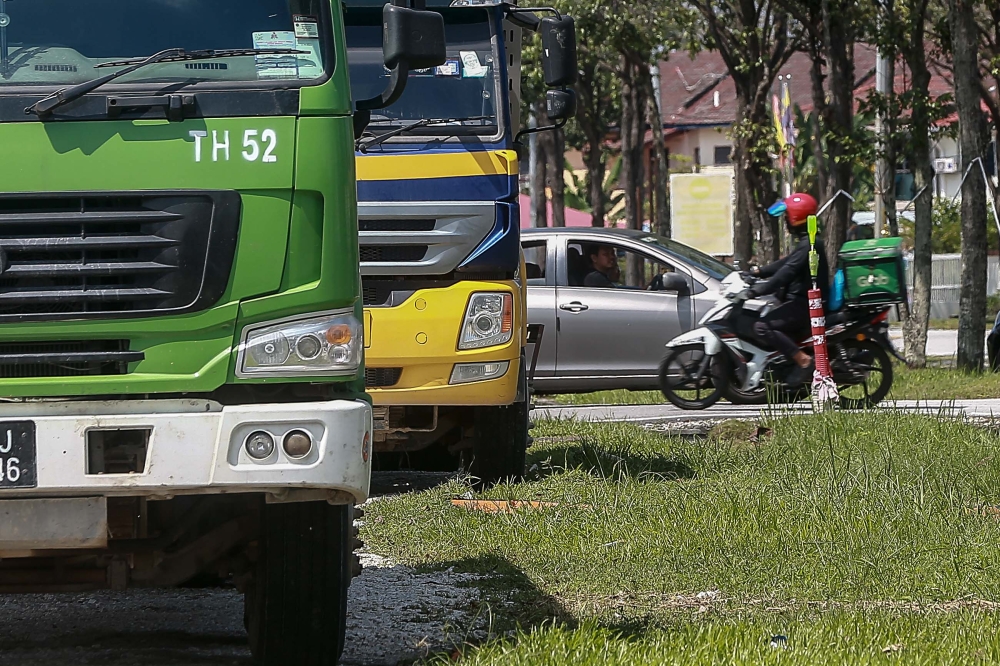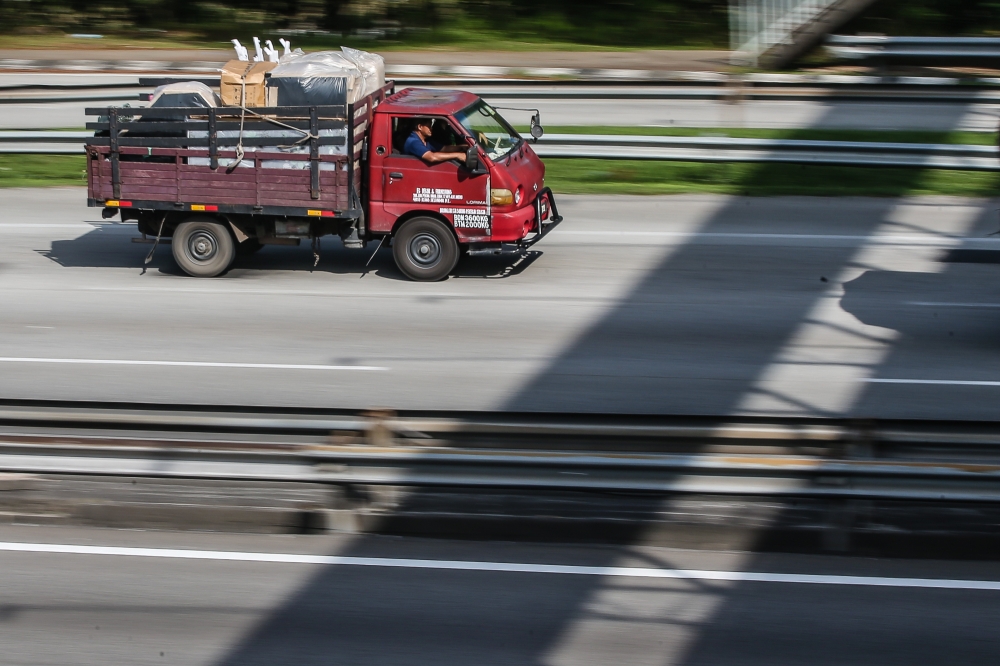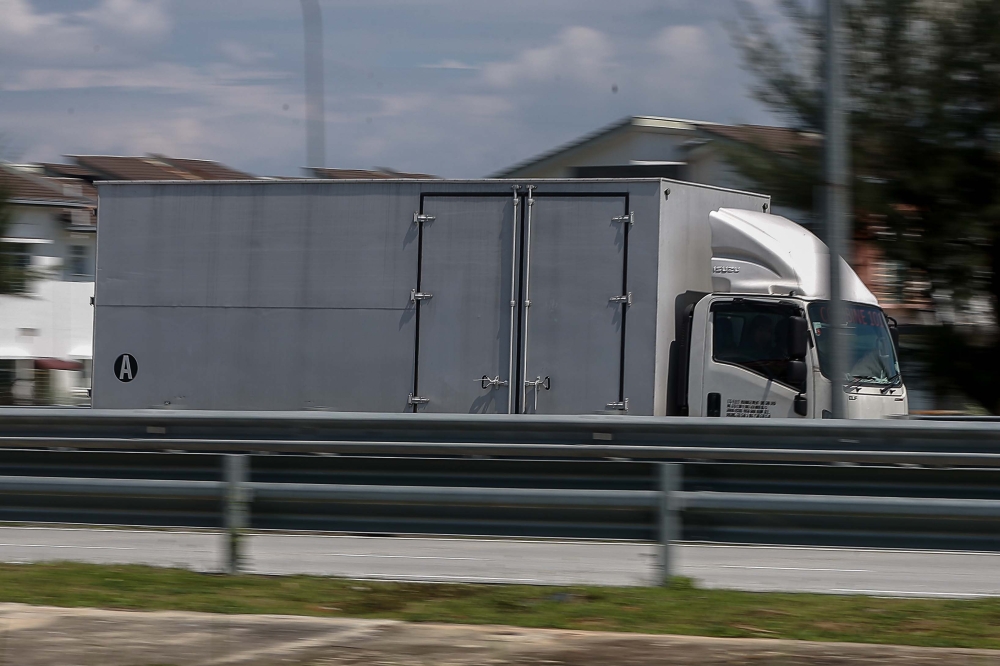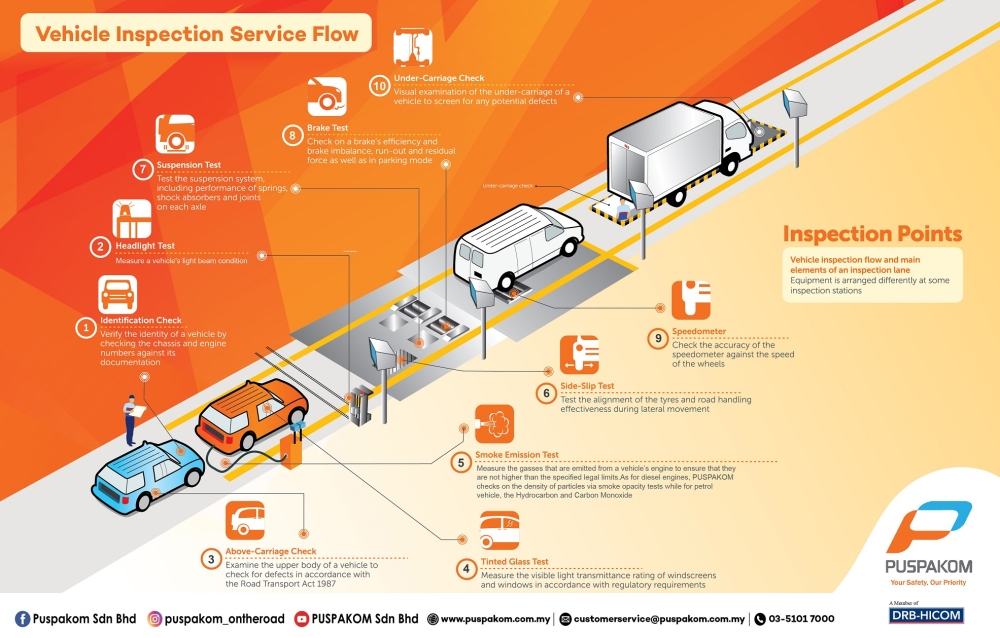KUALA LUMPUR, Jan 6 — Do you know what rules are imposed in Malaysia to ensure lorry drivers are fit to drive, and to reduce risks of the lorries becoming part of fatal road accidents?
How much does it cost for lorry drivers and lorries to meet some of the licencing requirements?
Here’s a quick summary of what we know, based on the latest information available on the Road Transport Department’s (JPJ) website and licensed vehicle inspector Puspakom Sdn Bhd’s website:
1. Do lorry drivers need to have a driver’s licence?
Yes. Just like any other drivers in Malaysia, they will need to pass the driving test and obtain a Competent Driving Licence (CDL) from JPJ.
The CDL requirements include not being a blacklisted driver, and costs RM30 per year for those handling heavy vehicles like lorries (Class E).
2. What are the conditions to obtain a vocational licence (which includes GDL)?
On top of having the CDL, those who want to be lorry drivers must also apply for a vocational licence from the JPJ, which costs RM20 per year.
The vocational licence covers the Goods Driving Licence (GDL) for lorry drivers; Public Vehicle Licence (PSV) for those who want to be bus, taxi or e-hailing drivers; and conductors.
Based on the Road Transport Department’s (JPJ) website, you must:
- be aged 21 and above (based on Road Transport Act 1987)
- have passed a medical examination
- have attended and passed the theory class and practical training
- your CDL must be valid for more than one year

3. What kind of medical conditions do lorry drivers or bus drivers get checked for?
To apply for a vocational driving licence, drivers must submit a certificate of fitness (Form JPJ L8A), which is where a doctor certifies to the JPJ whether the driver is fit to apply for the licence.
As part of that form, drivers are required to self-declare their medical history.
Medical history self-declaration
Drivers must self-declare the following 15 items regarding their medical history:
- Vision or hearing problems
- Epilepsy
- Heart disease
- High blood pressure
- Shortness of breath
- Diabetes
- Mental illnesses
- Sleep disturbances
- Headaches, dizziness, blackout, or fainting spells in the past six months
- Current treatment for any medical condition
- History of drug misuse, alcohol, or medication misuse
- Accidents within the past year
Doctor's medical examination checklist
The doctor completes a checklist of 26 items covering six sections:
- Vision
- Hearing
- Neurology and musculoskeletal conditions
- Cardiovascular system
- Respiratory system
- Diabetes
The doctor also evaluates eight items to assess the risk of obstructive sleep apnoea (OSA).
Conditions leading to unfitness
The Health Ministry’s standards list conditions where drivers would be declared unfit to apply for a vocational licence, including:
- Night blindness
- Alcohol dependency or a strong history of alcohol abuse
- Persistent drug abuse
- Symptoms of heart failure
- Diabetes (hypoglycemia) with recent loss of consciousness
- Untreated sleep apnoea with severe daytime sleepiness
In other words, the health check filters out individuals who have medical conditions that will make it unsafe for them to drive commercial vehicles like lorries.
If the doctor says they are unfit, they cannot apply for or renew the vocational driving licence.
Examination costs and additional requirements
- The medical examination costs between RM40 and RM200, based on the MMA’s January 2022 guideline.
- Blood and urine tests, including urine drug tests, are not part of the standard examination.
- Diabetic applicants must provide their latest HbA1C blood test results or undergo a separate test (additional charges apply).
4. How often must the health checks be conducted?
Every year.
This is because lorry drivers and bus drivers can only renew their vocational licence for one year only, and the medical report (Form JPJ L8) is valid for one year only.
So to renew the licence, the drivers have to go for a new medical check.
5. Companies can check potential lorry driver’s record first
Before hiring drivers, transportation companies can apply for a free check of JPJ’s Vocational Driver Profile System (SPPV) to make sure the driver does not have a bad record of violating traffic laws.
The SPPV system provides information such as whether the driver has been blacklisted, whether their driving licence has been suspended, and information regarding traffic summonses.

6. What about the lorries? How do we know if the vehicles are safe for the road?
For commercial vehicles like lorries, the documents required to obtain a motor vehicle licence for the first time from the JPJ include: the vehicle’s inspection report and inspection certificate issued by the inspector, which would typically be Puspakom.
Puspakom checks whether vehicles are roadworthy, or in other words fit and safe to be driven on the road. (Puspakom was the sole concessionaire until August 31 and became Malaysia’s first vehicle inspection licensee on September 1).
When renewing the motor vehicle licence, the vehicle must have both a valid insurance coverage and a still-valid Puspakom inspection report, according to JPJ’s website.
For commercial vehicles and trailers, the motor vehicle licence can be renewed for a maximum of one year (in the first two years after it was first registered), and for a maximum of six months (after the first two years).
For container trailers, the motor vehicle licence can be renewed for a maximum one year (in the first 10 years after it was first registered), and for a maximum six months (after the first 10 years).
In other words, for older vehicles, the renewal period for the motor vehicle licence would be shortened to just six months only.

7. So what does Puspakom check the lorries for?
Based on the Road Transport Act 1987’s Section 66B, all commercial vehicles must undergo routine inspection every six months.
The routine inspection by Puspakom could cost between RM55 to RM75, depending on the type of vehicle (lorries with a laden weight or BDM of below 6,000kg or more than 6,000kg; trailers or semi-trailers).
According to Puspakom’s latest Commercial Vehicle (Goods) Inspection Guidelines as of June 2024, the inspections include checks that the vehicle can stand the load’s weight when used, and that its body parts — which are designed to carry or load capacity — are not cracked, broken, or rusted.
Other checks include ensuring that the tyres’ type and condition fit the required standards, and that the tyres are properly fitted and of the same size when used on the same axle.
The same guideline states that lorries with frequent failures such as for their brakes would need to undergo repairs and continuous maintenance.
The guidelines also state that commercial vehicles which fail the brake test more than three times would be automatically blacklisted, and JPJ would be informed and which will result in the vehicle being prohibited from being on the road.
The commercial vehicle owner’s must get JPJ’s permission for a reinspection of the vehicle after its brake issues are repaired, while reinspection for other types of test failures would not require any referral to JPJ first, the Puspakom guidelines said.

To sum it up:
Licensing requirements:
- Lorry drivers need a Competent Driving Licence (CDL, RM30/year) and a Goods Driving Licence (GDL, RM20/year).
- Applicants must be 21+, pass medical exams, and have a valid CDL for over one year.
Medical checks:
- Annual medical exams are required to renew vocational licences.
- Drivers must self-declare medical history (e.g., vision, epilepsy, diabetes) and undergo a doctor’s evaluation.
- Costs for medical exams range from RM40 to RM200; diabetic drivers may need additional tests.
Health standards:
- Drivers with conditions like untreated sleep apnoea, alcohol dependency, or recent hypoglycemia are deemed unfit.
Vehicle inspections:
- Lorries undergo mandatory Puspakom inspections every six months (RM55–RM75).
- Inspections check roadworthiness, including brakes, tyres, and structural integrity.
Vehicle licence renewals:
- Renewals require valid insurance and a current Puspakom inspection report.
- Renewal periods vary: up to one year for newer lorries, six months for older ones.
Driver record checks:
- Employers can use JPJ’s free Vocational Driver Profile System (SPPV) to check drivers’ traffic records.



















